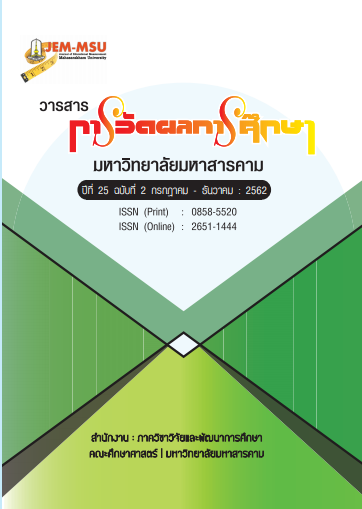The Role of Thai Teachers in Education 4.0
Main Article Content
Abstract
The roles of Thai teachers need to be adjusted according to each period of time to keep up with the situation with changes on many aspects, particularly at the present time, which is the era of modern information and communication technology and is entering the 4.0 era. In this era, one can access more information and can do it more quickly. Therefore, teachers need to adjust themselves to be ready and develop themselves to keep up with the changing era. They must also be eager to develop modern technological skills in order to bring about learning of new effective techniques of learning and teaching methods, including the use of artificial intelligence in teaching and learning. The teachers must prepare children by organizing the process that enables children to know their own likes and aptitudes, and promote the development of children according to their preferences and capacities.
Article Details
The content and information contained in the published article in the Journal of Educational Measurement Mahasarakham University represent the opinions and responsibilities of the authors directly. The editorial board of the journal is not necessarily in agreement with or responsible for any of the content.
The articles, data, content, images, etc. that have been published in the Journal of Educational Measurement Mahasarakham University are copyrighted by the journal. If any individual or organization wishes to reproduce or perform any actions involving the entirety or any part of the content, they must obtain written permission from the Journal of Educational Measurement Mahasarakham University.
References
โรงพิมพ์ชุมนุมสหกรณ์การเกษตรแห่งประเทศไทย.
จิตรา สุขเจริญ. (2561). การจัดการศึกษาในยุค 4.0 วิทยาลัยพยาบาลบรมราชชนนี ชลบุรี.
ดิเรก พรสีมา. (2562) “ครูไทย 4.0 ตอนที่ 1”. ครูบ้านนอก.คอม. [ออนไลน์]. ได้จาก: https://www. kroobannok.com/80446. [สืบค้นวันที่ 10 มกราคม 2562].
ไพฑูรย์ สินลารัตน์. (2557). สัตตลักษณ์ของครูผู้นำ. กรุงเทพฯ : โรงพิมพ์แห่งจุฬาลงกรณ์มหาวิทยาลัย.
. (2560). การศึกษา 4.0 เป็นยิ่งกว่าการศึกษา. พิมพ์ครั้งที่ 4. กรุงเทพฯ : โรงพิมพ์แห่ง จุฬาลงกรณ์มหาวิทยาลัย.
ภาสกร เรืองรอง และคณะ. (2557). “เทคโนโลยีการศึกษากับครูไทยในศตวรรษที่ 21” วารสารปัญญาภิวัฒน์ ปีที่ 5 ฉบับพิเศษ ประจำเดือนพฤษภาคม 5(5), 195-205.
วรพจน์ วงศ์กิจรุ่งเรืองและอธิป จิตตฤกษ์.(2554). ทักษะแห่งอนาคตใหม่ : การศึกษาเพื่อศตวรรษที่ 21.
แปลจาก 21st Century Skills: Rethinking How Students Learn. [ออนไลน์]. ได้จาก: https://openworlds.in.th/books/21st-century-skills/ [สืบค้นเมื่อวันที่ 10 มกราคม 2562]
ศศิธร บัวทอง. (2560). “การวัดและประเมินทักษะการเรียนรู้ในศตวรรษที่ 21”. Veridian E-Journal, Silpakorn University ฉบับภาษาไทย สาขามนุษยศาสตร์ สังคมศาสตร์ และศิลปะ ปีที่ 10
ฉบับที่ 2 เดือนพฤษภาคม – สิงหาคม 2560, 1856-1867 .
ศิริพร ปัญญาจันทร์. (2561). บทบาทครูในยุคปัจจุบัน. [ออนไลน์]. ได้จาก: https://www.inf-education. com/Quality%20assurance/Academic/file/e-teacher.pdf [สืบค้นเมื่อวันที่ 14 ตุลาคม 2561]
สุนันท์ สีพาย. (2560). การศึกษาคุณลักษณะของครูที่ดีในศตวรรษที่ 21. มหาวิทยาลัยราชภัฏชัยภูมิ
(งานวิจัยนี้ได้รับทุนอุดหนุนจากงบประมาณแผ่นดินด้านการวิจัย ปีงบประมาณ 2560)
สุนันท์ สีพาย และไพฑูรย์ สินลารัตน์. (2561) “เปลี่ยนผ่านการศึกษาไทยสู่ การศึกษา 4.0” วารสารการ
วัดผลการศึกษา มหาวิทยาลัยมหาสารคาม. ปีที่ 24 ฉบับที่ 2 ธันวาคม 2561,13-27.
อุบล เลี้ยววาริน. (2556). ความเป็นครูวิชาชีพ. วิทยาลัยการฝึกหัดครู. มหาวิทยาลัยราชภัฏพระนคร.
อนุวัต คูณแก้ว. (2559). การวัดและประเมินผลการศึกษาแนวใหม่. กรุงเทพฯ : โรงพิมพ์แห่งจุฬาลงกรณ์ มหาวิทยาลัย.


